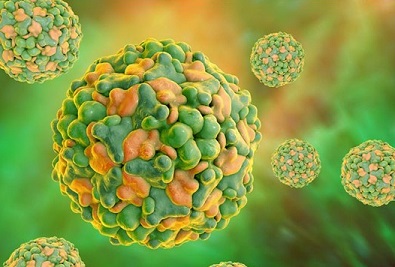Nikhil Prasad Fact checked by:Thailand Medical News Team Oct 23, 2024 1 year, 1 month, 4 weeks, 1 day, 21 minutes ago
Medical News: Scientists from China and Sichuan University have made a groundbreaking discovery in the fight against enteroviruses, identifying a novel peptide that shows promise in combatting a wide range of viruses, including EV-D68 and EV-A71. Enteroviruses, which are responsible for diseases like hand, foot, and mouth disease and respiratory infections, pose significant public health challenges due to the lack of effective treatments.

The new study, led by researchers at the National Key Laboratory of Infectious Diseases and the Center of Growth, Metabolism and Aging at Sichuan University, highlights the effectiveness of a peptide named P25. This
Medical News report focuses on how P25 blocks viral infections by targeting key viral mechanisms.
A Promising Discovery for Multiple Viruses
Enteroviruses have long been a public health concern, affecting millions of people each year, especially children. EV-D68, a virus that can cause respiratory illnesses, and EV-A71, often linked to hand, foot, and mouth disease, are among the most well-known. Until now, treatment options for such infections were limited, but this study brings hope.
The study found that the peptide P25, derived from a specific region of the virus's VP1 protein, exhibited strong antiviral activity against several strains of enteroviruses. P25 worked by blocking the virus’s ability to bind to and infect cells. Moreover, it stabilized the viral capsid, preventing the virus from releasing its genetic material into host cells. In lab experiments, P25 effectively reduced the ability of enteroviruses to replicate, making it a promising candidate for further drug development.
How P25 Works Against Enteroviruses
Peptides are short chains of amino acids, the building blocks of proteins, and they can play significant roles in biological processes. In this case, P25 works by targeting multiple points in the viral infection process. It competes with the virus for access to the heparan sulfate (HS) receptor, which viruses like EV-A71 use to attach to host cells. This blocking action prevents the virus from getting inside cells and spreading.
Furthermore, P25 interacts directly with the viral capsid, a protein shell that protects the virus's genetic material. By binding to this shell, P25 stabilizes it, making it harder for the virus to release its genetic material - a crucial step in viral replication. Without the ability to release its genome, the virus cannot reproduce and spread.
The peptide’s broad-spectrum activity means that it is effective against different types of enteroviruses, making it a potential universal treatment for these infections. Researchers noted that the peptide’s antiviral action was not limited to a single type of virus, which adds to its significance.
The Importance of Broad-Spectrum Antivirals
Enteroviruses belong to a large family of viruses, and they are grouped into several species, including EV-A, EV-B, EV-C, and EV-D. Some strains are responsible for mild illnesses, while others can lead to more severe diseases like enceph
alitis. With over 116 types of enteroviruses known to infect humans, finding a drug that works across multiple strains has been a major challenge for researchers.
The study highlights how P25’s ability to target several strains of enteroviruses makes it a potential breakthrough in the field of antiviral research. Unlike many antiviral drugs that are specific to one type of virus, broad-spectrum antivirals like P25 could be used to treat a range of viral infections, reducing the need for multiple medications.
Laboratory Testing and Results
The study’s laboratory tests involved treating virus-infected cells with P25 at different stages of infection. The researchers found that the peptide was effective whether it was administered before, during, or after the viral infection had begun. This flexibility suggests that P25 could be useful not only for preventing infections but also for treating active infections.
In tests involving multiple enterovirus strains, P25 consistently reduced the viral load by a significant margin. For instance, in EV-A71 and EV-D68 infections, the peptide reduced the number of infectious virus particles by up to 90%, depending on the strain and the concentration of the peptide used. In addition to reducing the viral load, P25 also lowered the production of viral proteins, further hindering the virus's ability to spread.
Potential for Clinical Applications
While the study was conducted in a controlled laboratory environment, the results are promising for future clinical applications. The peptide P25 could be developed into a new antiviral drug to treat enterovirus infections in humans. However, more testing is needed to determine its safety and efficacy in humans.
The next step for researchers will be to conduct clinical trials to assess the peptide's effectiveness in a real-world setting. If successful, P25 could become part of the treatment protocol for enterovirus infections, providing doctors with a much-needed tool to combat these widespread viruses.
Conclusion
This discovery of the peptide P25 offers a potential solution to the growing problem of enterovirus infections. By blocking the virus’s entry into cells and stabilizing its capsid, P25 can significantly reduce the spread of the virus in the body. Its broad-spectrum activity also makes it an appealing candidate for future antiviral treatments.
The study findings were published in the peer-reviewed journal: Biomolecules.
https://www.mdpi.com/2218-273X/14/10/1331
For the latest on enteroviruses, keep logging on to Thailand
Medical News.
Read Also:
https://www.thailandmedical.news/news/polish-scientist-warns-of-the-emergence-of-a-highly-pathogenic-echovirus-11-variant-known-as-d5-during-the-ongoing-covid-19-pandemic
https://www.thailandmedical.news/news/american-medical-experts-warn-of-enterovirus-d68-resurgence-that-can-cause-severe-respiratory-and-neurological-disease-in-children
